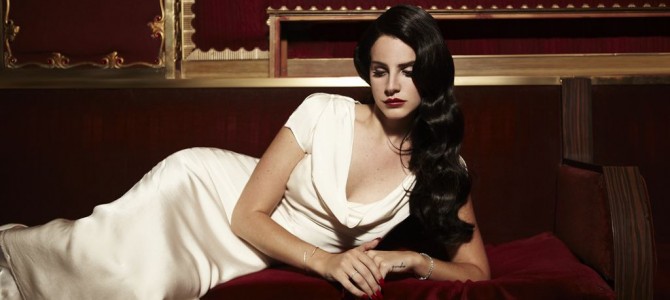
Death can be beautiful, but not in the way Lana Del Rey imagines it through her music. Recently the up-and-coming pop artist came into some controversy for something other than her style or her past. Critics are calling it a “death wish,” after Del Rey told a reporter, while discussing the early deaths of the musicians she admires, “I wish I was dead already.”
What’s surprising about the controversy is that much of the surrounding dialogue focuses on whether Del Rey actually meant what she said (fitting into the long-standing narrative that Lana isn’t “authentic”), not its moral standing – as if the real problem wasn’t what she said, but whether she was being insincere about it. A series of reprimanding tweets from Frances Bean Cobain, daughter of the late Kurt Cobain, was an exception. She tweeted:
@lanadelrey: The death of young musicians isn’t something to romanticize…I’ll never know my father because he died young & it becomes a desirable feat because ppl like u think it’s ‘cool’…Well, it’s f—ing not. Embrace life, because u only get one life. The ppl u mentioned wasted that life. Don’t be 1 of those ppl.
Props to Frances Bean for shedding some light on the more important aspect of the “death wish” controversy—the actual expression of a desire to cut your life short. Maybe Del Rey is clinically depressed, but depression doesn’t compel you to make alarming statements about your own mortality. Depression is an internal struggle that fatigues the body and soul the longer it rages—indeed, Del Rey writes in the song “Ride” from her last album, “I’ve got a war in my mind.”
Ultimately, though, the “death wish” doesn’t derive from Del Rey’s mental state, but rather the values she espouses. I wonder, in that moment before actually ending it, if she would give pause to consider the family and friends she would leave behind?
Live Fast, Die Young?
As she speaks softly and slowly in her music video for “Ride”: “We had nothing to lose, nothing to gain, nothing we desired anymore. Except to make our lives into a work of art. Live fast. Die young. Be wild, and have fun…who are you? Are you in touch with all of your darkest fantasies? Have you created a life for yourself where you can experience them? I have. I’m f*&^ing crazy. But I am free.”
Del Rey seems to rate living on the open road with a bunch of bikers (whether this actually happened is irrelevant), watching them ride through bonfires, and waving guns around her head as “being crazy.” Yet the entire script of “Ride” is about what she believes, and it all centers around living fast and dying young.
Two of her other music videos, “Born to Die” and “Summertime Sadness” glorify suicide. At the end of “Born to Die,” as the music starts to fade, the camera zooms out from Del Rey’s bloody corpse in the arms of her boyfriend, her head hanging upside down facing the camera. The remains of their deliberate collision with a semi-truck burn intensely on the highway behind them, sharpening their silhouette. In “Summertime Sadness,” the video flashes between two slow motion scenes of Del Rey throughout the song: in one she falls forward off a bridge, with the fabric of her dress billowing gracefully around her; in the other she spreads her arms out, as if welcoming death, as she drops from view off the top of a cliff. She sings that she would “die happy tonight.”
The Religion Of Self
It’s obvious that Del Rey fantasizes about death. But it’s not just tragic for her, it’s indicative of a more widespread infection of ego-centric secular humanism in the popular culture we all share. The celebrity community, by and large, have long promoted the “live fast, die young” motto, and we all know how well that’s turned out for so many young members of the celebrity class. It’s not an innate fearless spirit and irrepressible desire to “be free” that cuts their lives short, or even a predisposition for addictive behavior, although that’s certainly a battle for many. It’s not any hardwired recklessness they were born with. It is, by and large, their value system. You might call it the Religion of Self, or Selfism, a radical offshoot of secular humanism, and Del Rey is a disciple.
“Live fast, die young” is a gospel tenet of the Religion of Self, and those who follow it into the grave have proven themselves faithful in the eyes of the radical community they left behind. Their deaths aren’t celebrated like those of martyrs, but their lifestyle, the worldview and practices that led them to their untimely deaths, is either celebrated, or the worst aspects of their life are glossed over and compensated for by their immense talent.
Their death becomes a part of their legend, and they are all the more fascinating for being “troubled.” It’s as if we’ve bought into this idea that to be a real legend in show business, you must be both talented and, to some extent, socially deviant—which usually plays a factor in their early deaths.
Romanticizing Self-Destruction
Del Rey herself said she admires Kurt Cobain and Amy Winehouse—one committed suicide, and the other sang about refusing to go to rehab then OD’d. She sings about living like Jim Morrison, who died at 27 from an apparent overdose. As she strokes her own cheek with the gleaming barrel of a pistol in “Ride,” she’s symbolically flirting with death, as if she is ready to join her idols in the grave.
We are left with at least the impression, then, that death through self-destruction (not just the deliberate kind) is romanticized in celebrity culture. Del Rey’s productions are just a few examples. Music and film celebrities have a significant influence in popular culture, with their actual productions being their most potent messaging. Del Rey’s music is steeped in violence and darkness, but her new album, “Ultraviolence,” is actually quite good, and therein lies the danger.
By danger, I’m not referring to Del Rey’s romanticizing of suicide and self-destruction—if that were the only societal danger, a good portion of her songs would simply be considered “edgy,” like a thousand other pop songs on the radio today. Despite my sympathies with Frances Bean Cobain, the romanticism of unnatural, early death isn’t the problem in itself, but the natural result of the permeation of the Religion of Self in our pop culture.
“Ultraviolence” shows Del Rey as an effective proponent the Religion of Self, just like a well-delivered sermon sweeps up your soul in the passion of conviction. Pop stars and preachers are much alike in that they are charismatic, they are masters of their practices and worship, and they know how to express their gospels in compelling ways.
It’s All About Me
The vast majority of Del Rey’s songs are about herself, how she feels, what she wants, and what she claims she needs. Drugs, sex, thrills, and innocence are lost. They are about self-gratification, acting on impulse, and damning the consequences. They are the sermons of radical secular humanism and its central theme of self, even if she may not think of them that way.
Live fast, die young. Do what makes you happy. Don’t care what others say. Be wild. Be free. Be glamorous. Follow your heart—this is the gospel of the Religion of Self. It does not give, but takes. It doesn’t create art, just spectacle. It destroys talent. It rips people from their loved ones, it devalues family and responsibility.
The romanticism of early death is just one of many ways the celebrity culture asserts that all that truly matters is you. The Religion of Self doesn’t just affirm your control over your own life, it insists that you are entitled to bringing about your own demise.
I used to believe that the great majority of suicides are not committed out of selfishness, but are a decision made when disease has clouded out all other choices. Depression can distort reality in ways those who haven’t experienced it can’t imagine. Yet Del Rey, regardless of her mental health, makes it a point to declare that she has a right to die by her own hand.
What sort of message does that send to young people who are struggling against clinical depression? Does it give them hope that life can get better, or does it feed the darkness that preys upon their minds, destroying what is left of their innocence and wearing down their will to live? What is left to pull them back from the edge? The last bastion against death’s temptation, when hope is gone, is the moral responsibility to your family and community to keep living. Del Rey and others of the Religion of Self are eroding the moral foundation for life, all in the name of the freedom to live, and die, how you please.








